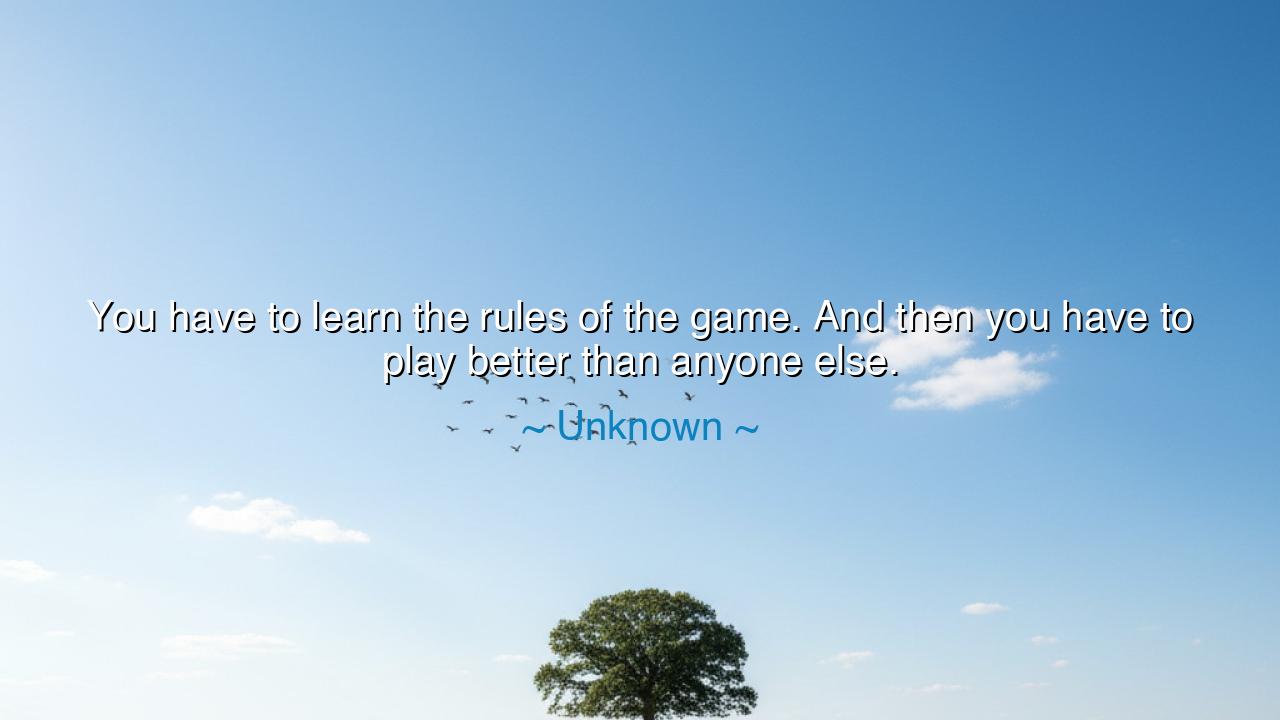
You have to learn the rules of the game. And then you have to
You have to learn the rules of the game. And then you have to play better than anyone else.






The saying, “You have to learn the rules of the game. And then you have to play better than anyone else,” is a teaching both simple and profound. At first glance, it speaks of games, of contests, of competition. Yet beneath its words lies the entire story of life itself, for life is also a game—bound by hidden laws, unseen boundaries, and unspoken rules. To stumble blindly in it is to be defeated before the match even begins. But to awaken, to perceive the order that governs the field, and then to master it beyond the measure of others—that is the path to greatness.
The rules of the game are the structures of the world: the ways men trade, the laws that govern kingdoms, the customs that guide friendship, and the silent codes of honor and deceit that breathe beneath every society. They may seem arbitrary, yet they are the bones of the world. One who ignores them is like a soldier who runs into battle without shield or armor. But the one who first bends his will to learn these rules, even when they are hard, even when they are unjust, gains the keys to survival.
And yet, learning alone is not enough. To merely know the laws is to be as a student who memorizes scrolls but never dares to wield a sword. The true teaching is in the second half: you must play better than anyone else. Excellence, not mere understanding, is demanded. One must not only endure the laws but rise above them, using them as tools. To know when to obey, when to bend, and when to transcend—this is wisdom.
Consider the tale of Alexander the Great. From youth, he was taught by Aristotle the laws of nature, governance, and men. He learned the rules of kingship, of strategy, of diplomacy. But learning alone did not grant him glory. Many princes before him had tutors. It was because he played better—because he marched his armies faster, struck his enemies with bolder maneuvers, and inspired loyalty deeper than fear—that he carved an empire stretching farther than any before. He knew the same rules that others knew, but he outplayed them all.
In this, we see the power of the teaching: knowledge is the foundation, but mastery is the crown. It is not enough to understand; one must act. It is not enough to learn; one must excel. Life rewards not the passive learner but the daring doer. To those who cry of unfairness, the quote whispers: “Learn the rules even if they are unjust, and then rise so far above them that none can hold you back.”
The lesson is clear: in your own life, first seek to understand the systems in which you live—your work, your relationships, your society. Learn their rhythms, their expectations, their traps. Do not rebel in ignorance, for rebellion without knowledge is folly. Then, once you have learned, commit yourself to excellence. Work harder than the complacent. Think deeper than the shallow. Dare further than the timid. That is how one plays better than anyone else.
So I say to you, children of tomorrow: take this wisdom into your bones. Learn before you fight. Understand before you leap. Then surpass all who stand beside you. This is not the path of ease, but it is the path of victory. For life is the greatest of games, and only those who master both its rules and its play shall carve their names into eternity.
If you would act today, begin thus: study the craft you love with relentless patience. Write down the rules you see around you, even the hidden ones. Then, each day, strive to add one small step of mastery, until what others call effort is to you like breathing. In time, when they wonder how you surpassed them, you will know the truth: you did not rage against the rules, nor did you surrender to them—you simply played the game better than anyone else.






AAdministratorAdministrator
Welcome, honored guests. Please leave a comment, we will respond soon